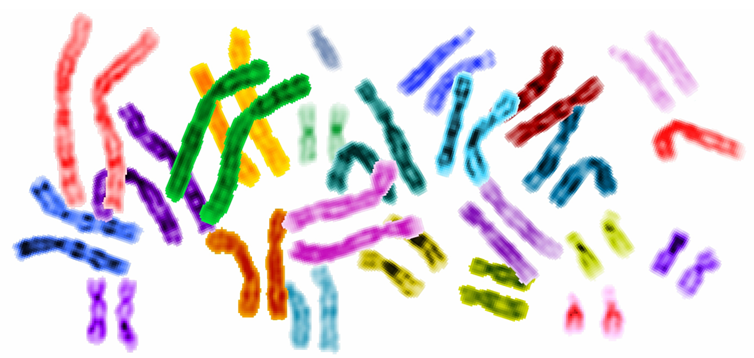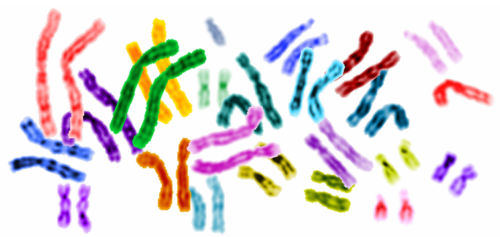There’s more to human beings than biology and physiology—and it shouldn’t be for sale.
In the last 70 years we’ve come a long way towards unraveling the building blocks of human life. The human genome has been identified, sequenced, mapped, decoded, and interfered with. We’ve used this knowledge to clone Dolly the sheep, discover breast cancer-causing genes and create stem cells from our own skin. And now we stand on an exciting precipice: perfecting technologies that allow us to edit our genes with precision.
But as we embark further on the gene revolution and allow corporations and governments to deconstruct human beings down to their most basic parts, we have to question whether we may lose not just some of those parts in the process but something much greater and more important—what it means to be truly human.
Let’s start with the technology. At the 2016 World Economic Forum in Davos, a panel called Humankind and the Machine brought together leading experts in technology, governance, and bioethics to discuss new technologies that are sure to have a major impact on humanity: artificial intelligence, cyber-security, genetics, and space colonization.
When questioned on whether advancements in biotechnology will eventually allow the manufacture of genetically designed human beings, both Jennifer Doudna from the University of California at Berkeley and Nita Farahany from Duke University answered emphatically in the affirmative. By 2030, they said, gene-editing technologies such as CRISPR will allow us to alter human genetics for specific outcomes. We will then be able to engineer the characteristics we choose in our children.
Genetic engineering like this raises a host of issues across different disciplines, but perhaps the most important is the challenge to our own conception of humanity and what it means to be an individual. The German philosopher Friedrich Nietzsche anticipated these questions in 1873 when he wrote, in Schopenhauer As Educator, that “At bottom every man knows well enough that he is a unique being, only once on this earth; and by no extraordinary chance will such a marvelously picturesque piece of diversity in unity as he is, ever be put together a second time.”
Nietzsche joins other existentialist thinkers like Søren Kierkegaard in insisting on humour, irony, parody and all manner of subjectivist tools to champion the uniqueness of individuals against the rationality of collective knowledge and the value of the group. Creativity, belief, and subjectivity are all ways in which our individual self thrives beyond the span of rational intelligence.
But when we start to delve into altering our own biological building blocks artificially via human cloning and engineered enhancements we open up a veritable Pandora’s Box—challenging this individualism by intimately exposing ourselves to society’s political economy and revealing our personal genetic information to more powerful groups. When genetics become the next currency for corporations and governments we risk the commercialization and politicization of who we are on a level far deeper than our skin.
This is not science fiction—it’s already happening. Up until 2013 it was possible for companies in the US to own and exploit patents commercially for genes they had discovered. Over 40 per cent of the human DNA sequence was privatized in this way until the US Supreme Court ruled that naturally occurring genes could not be patented in its judgment on the case of Association for Molecular Pathology et al v Myriad Genetics. However, modifications to any genes in the DNA sequence can still be legally made.
In response to the Supreme Court’s ruling, corporations moved beyond commercializing gene patents through lab testing. They realized that the real value lies in modifications and interventions—developing drugs or techniques to combat genetic conditions or provide useful alterations to our genetic code. It’s estimated that the gene editing market alone will grow by double digits to reach a global value of $3.5 billion by 2019. This does not include the added value that will accrue to the pharmaceuticals industry over time. Consequently, firms are scrambling to capitalize on the growing value of genetic information because the bits and pieces that make us human now have a great deal of commercial importance to others.
For example, 23&Me is a startup backed by GV (formerly Google Ventures) and tech billionaire Yuri Milner which allows consumers to spit into jar at home and send their genome off for ancestry and health testing. While firms like 23&Me seem to have good intentions in terms of fighting genetic conditions such as Parkinson’s Disease, its recent $60 million investment deal with Genentech highlights that the firm’s future is really in the information business. An estimated two-thirds of their consumers have innocuously signed up to have their genes tested and stored in 23&Me’s database.
As Internet companies have already realized, information can be extremely valuable. But when products and services require consumers to provide such intimate information in return for access, genuine consent is undermined. This makes us more vulnerable to data mining, theft and manipulation. As various parts of our DNA are bought, sold, and valued in the marketplace, we enter the age of the quantified self. Will our deeper sense of who we are be cheapened in the process?
These commercial issues raise a fundamental political question: countries like Mexico and India have started a controversial race to protect the genetic integrity of their populations from foreign exploitation. So-called ‘genomic sovereignty’ is already presenting public policymakers with a host of new legal and ethical dilemmas, not least because populations in a country are not necessarily genetically confined within their geographical boundaries. And as global competition among states increases, governments like China are looking to genetics to engineer ‘enhanced’ populations in order to gain an edge over other players.
All of this comes at a cost to society. As researchers like Ruha Benjamin have pointed out, the effect of creating nationalistic identities based on genetic groupings appears to be “a (re)biologization of the nation-state in the branding of [for example] ‘Mexican’ DNA”, which is really a dynamic calibration of the DNA of different populations. Put another way, the state may politicize its population through this process and assign a different value to groups within and outside of its territory. As a result, individual identities may be lost to the identity of the larger group, and we may see the emergence of genetically privileged populations over disadvantaged ones.
Both the commercialization and the politicization of human genetics require us to reconsider how we value our individual diversity and integrity, and what steps we need to take to safeguard these things for the future. Article Two of UNESCO’s 1997 Universal Declaration on the Human Genome and Human Rights explicitly acknowledges that people have an inherent dignity that makes it “imperative not to reduce individuals to their genetic characteristics and to respect their uniqueness and diversity.” While some countries have enacted bioethics legislation to address these challenges, few have gone very far in re-interpreting their constitutional frameworks around the preservation of human dignity and individualism.
Back at Davos, the panel on Humankind and Machine suggested two important ways in which we might safeguard our integrity moving forward. First, education at all levels is crucial: there’s an immediate need to raise awareness levels about the gene revolution and its implications for society.
Second, instead of relying on rigid law-making, deliberative democracy should be used to engage multiple stakeholders in policy-making, including civil society groups like the Forensic Genetics Policy Initiative. An informed population with strong, democratic institutions is going to be more equipped to balance the rights of individuals with society’s need to innovate and create beneficial technologies.
Even with these safeguards in place however, the moral dimensions of individuality may well become less important than the commercial benefits of new gene technologies over time. In rethinking humanity along these lines we must listen to thinkers like Nietzsche and Kierkegaard who insist that there is something more to human beings than our biology and physiology—and it’s not for sale.

